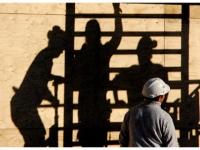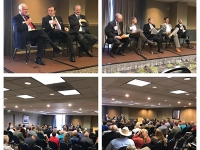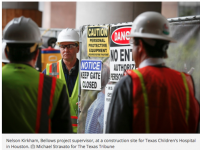Following high-profile immigration raids and a shift in the enforcement stance of the federal government, there have been reports around Texas over the last week that some construction workers do not feel safe reporting to work.It may all be a matter of perception, given that President Trump has described the raids as a wide “military operation” while the Department of Homeland Security portrayed the recent enforcement actions as fairly routine. But that perception can be a reality for the industry if there is fear among a large percentage of the workforce that they may be rounded up on jobsites.“The Texas (and national) construction industry has been suffering a workforce shortage for many years now,” said Phil Thoden, President of AGC Austin. “In fact, the latest AGC of America survey conducted in 2016 found that 74% of Texas contractors are having trouble filling craft worker positions, and that number has been consistently high for several years.”
A proposal aimed at making it even more difficult than it already is for organized labor groups to operate in Texas is one step closer to reality. Senate Bill 13 would make it illegal in this "right to work" state for the members of certain groups to have their union dues immediately deducted from government paychecks. Under Texas law today, no person can be required to be in a union as a condition of employment. In other words, all union membership in Texas is voluntary. On a party-line vote this past week, the Texas Senate State Affairs Committee sent the bill to the full Senate for consideration. But in a state government controlled by Republicans, who generally support the idea, the measure still faces an uncertain future because – please excuse the cliché – the devil is in the details.
February 21, 2017
A construction company in Washington state faces stiff fines for "numerous repeated safety violations" that reportedly "exposed workers to potential falls and other hazards at a residential construction site." The Washington State Department of Labor & Industries slapped J&I Construction with fines resulting from multiple violations. Now the company owes more than $200,000.More from the Insurance Journal:The three violations, each with a penalty of $42,000, were for not providing proper fall protection to three employees who were working on the top edge of a wall nearly 20 feet off the ground, and the company has been cited two other times for the same issue, according to L&I.J & I was also cited for three repeat violations for not having a plan outlining the fall hazards on the specific job, exposing workers to unguarded wall openings that they could fall through and for not ensuring that workers didn’t stand or step on the top of a self-supporting ladder. Each violation carries a penalty of $21,000.The company was cited for two additional repeat violations for not having railings on open-sided stairs to protect employees from falls ($5,600), and for not ensuring that employees wore hard hats where there was a danger of flying or falling objects ($4,200).
February 13, 2017
Through their various trade associations, construction executives from all over Texas are letting state lawmakers know what they think about issues that impact the industry. The Texas Construction Association, the Associated Builders and Contractors of Texas, and other groups have compiled lists of reforms and proposed changes to state laws that they hope will be enacted during this legislative session. As you may know, the Texas Legislature only meets in regular session for five months every two years. There are some fairly complex policy questions involved, which is part of why lawmakers must first hear from those who are directly affected before any changes can be made during a limited time frame. This past week, I had the honor of speaking to contractors gathered in Austin for the Texas Construction Association’s bi-annual Walk on the Capitol. I've been pleased to be part of this great event for three legislative sessions in a row. This session, the TCA has prioritized reforms to the state’s lien laws, worker misclassification legislation, and other things.
February 07, 2017
President Donald Trump's proposed border wall isn't just highly controversial. Now that he’s been elected and has begun the process of fulfilling campaign promises, it is also becoming more apparent the project is a logistical nightmare for a variety of reasons, not the least of which is a lack of enough skilled workers to build what would be one of the largest public infrastructure projects in history.Bloomberg News puts a fine point on it:A labor shortage has left few hands to build houses and factories in the region, where wages have already been rising and projects delayed. Now, the president’s plan for “immediate construction of a border wall” will force the government to find legal builders for a project that could employ thousands if not tens of thousands.
January 30, 2017
Amid high unemployment in areas like the Midwest where people have in almost no way been encouraged to retrain themselves and while there are calls for increases in the minimum wage for jobs in fast food, the construction industry is offering good paying jobs but hurting for workers in a big way.There are a variety of reasons for this, naturally. The problem is especially bad in North Texas, reports the Dallas Morning News:Dallas-Fort Worth leads the country in construction of both houses and apartments. The lack of skilled labor is adding months to construction timelines and helping to inflate property prices in Big D and beyond.
January 23, 2017
After an increase in construction related deaths, the New York City Council is poised to consider a raft of proposals aimed at increasing safety on jobsites throughout the largest city in America. Crane safety is on the minds of council members as is the oversight of smaller jobsites. If this package is passed, there would be stricter monitoring of “troubled actors” and increased penalties for lawbreakers.More details from a site called Crain's New York Business:The legislation, called the Construction Safety Act, is led by Council Speaker Melissa Mark-Viverito, but some elements could face resistance from Mayor Bill de Blasio, who has ambitious goals for housing development and has clashed with construction-worker unions. The mayor has already expressed skepticism with one of the council measures, a bill to require training programs for construction workers.
January 16, 2017
As the Texas Legislature convenes this week in Austin to make and revise the state’s laws over the course of the next five months, the associations representing the commercial construction industry are on the same page about quite a few issues they'd like to see lawmakers address. Unless otherwise ordered by the governor, Texas lawmakers only meet once every two years for 140 days in a regular session. Construction Citizen reviewed the legislative priorities published by the Texas Construction Association, the Associated General Contractors Texas Building Branch and the Associated Builders and Contractors of Texas. The groups are working together on a push to simplify the state's lien laws, but have different takes on things like reining in labor unions and they’ll each be on guard for any immigration-related initiatives. On that last point, the groups would like to ensure fairness for the construction industry if the Texas Legislature acts on mandatory E-Verify for example.
January 10, 2017
Two markedly different approaches to addressing workforce challenges are now featured in Texas Tribune, a statewide nonprofit news organization. Reporter Neena Satija took an in-depth look at both the Construction Career Collaborative, or C3, in Houston as well as the Workers Defense Project in Austin.Workers Defense has earned significant mainstream media coverage in Austin and nationally – in fact, the New York Times called it “a union in spirit” – likely because it is often controversial and is seen by many as adversarial with business. C3 has been covered extensively by Construction Citizen but has seen less coverage in venues like the Houston Chronicle, for example. The story in the Tribune says Workers Defense seems to have “more teeth” than C3 and notes the advocacy group has often partnered with government to help achieve its goals.
January 03, 2017
Heading into the new year, the federal government is ramping up efforts to educate employees and employers about the harms caused by worker misclassification. It’s a problem we’ve documented extensively over the years on Construction Citizen.Our readers know very well that worker misclassification happens when a business pretends its employees are “independent subcontractors” with the intent of avoiding payroll taxes and benefits like workers’ compensation insurance and – thanks to reduced labor costs – are able to submit lower bids for projects, undercutting law-abiding companies. Of course, there are many legitimate and legal uses of contract labor. The problem arises when businesses abuse the designation with the intent of skipping out on taxes and providing benefits for people being utilized as employees.The Department of Labor this month launched a new webpage devoted to the topic. The site makes the case that worker misclassification negatively impacts everyone: Workers, employers, and all taxpayers who have to pick up the slack when unscrupulous employers shirk their responsibilities.
December 28, 2016






















